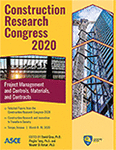Construction Research Congress 2020
The Formation of Construction Bid-Rigging: An Analysis Based on the Theory of Planned Behavior
Publication: Construction Research Congress 2020: Project Management and Controls, Materials, and Contracts
ABSTRACT
Bid-rigging is one of the most detrimental deviant practices in the construction industry. Management of bid-rigging is challenging and has been argued to be insufficient. One explanation is that the underlying mechanism of bid-rigging behavior remains vague. This paper investigated contractors’ cognition on bid-rigging, and further identified the significant cognitive factors that promote contractors’ bid-rigging formation. The research finds that contractors have a supportive attitude toward bid-rigging, and they have high-risk tolerance for bid-rigging. Furthermore, contractors’ attitude, normative beliefs, and control beliefs toward bid-rigging significantly affect their intention to bid-rigging. The research contributes to the existing literature by taking the first step to study the role of cognition in bid-rigging intention formation. This research facilitates the understanding of the nature of the bid-rigging activity.
Get full access to this article
View all available purchase options and get full access to this chapter.
REFERENCE
Ajzen, I. (1991). “The theory of planned behavior.” Organizational behavior and human decision processes 50(2): 179-211.
Allenby, G. M. and P. J. Lenk (1994). "Modeling household purchase behavior with logistic normal regression." Journal of the American Statistical Association 89(428): 1218-1231
Arai, K., I. Ishibashi and R. Ishii-Ishibashi (2011). “Research and analysis on bid rigging mechanisms.” Japan and the World Economy 23(1): 1-5.
Bolotova, Y., J. M. Connor and D. J. Miller (2008). “The impact of collusion on price behavior: Empirical results from two recent cases.” International Journal of Industrial Organization 26(6): 1290-1307.
Brosig, J. and J. P. Reiß (2007). “Entry decisions and bidding behavior in sequential first-price procurement auctions: An experimental study.” Games & Economic Behavior 58(1): 50-74.
Choi, B. and S. Lee (2017). “An empirically based agent-based model of the sociocognitive process of construction workers’ safety behavior.” Journal of Construction Engineering and Management 144(2): 04017102.
Choi, S. Y., Y. S. Kang and H. Lee (2008). “The effects of socio-technical enablers on knowledge sharing: an exploratory examination.” Journal of Information Science 34(5): 742-754
Ding, X.-L. (2001). “The quasi-criminalization of a business sector in China.” Crime, Law and Social Change 35(3): 177-201
Goh, Y. M. and N. F. Binte Sa’adon (2015). “Cognitive factors influencing safety behavior at height: a multimethod exploratory study.” Journal of Construction Engineering and Management 141(6): 04015003
Grube, J. W., M. Morgan and S. T. McGree (1986). “Attitudes and normative beliefs as predictors of smoking intentions and behaviours: A test of three models.” British Journal of Social Psychology 25(2): 81-93
Gupta, S. (2001). “The effect of bid rigging on prices: a study of the highway construction industry.” Review of Industrial Organization 19(4): 451-465
Huesmann, L. R. and N. G. Guerra (1997). “Children's normative beliefs about aggression and aggressive behavior.” Journal of personality and social psychology 72(2): 408
Ishii, R. (2009). “Favor exchange in collusion: Empirical study of repeated procurement auctions in Japan.” International Journal of Industrial Organization 27(2): 137-144.
Jaspers, J. D. (2017). “Managing cartels: How cartel participants create stability in the absence of law.” European Journal on Criminal Policy and Research 23(3): 319-335.
Jeon, S., Y.-G. Kim and J. Koh (2011). “An integrative model for knowledge sharing in communities-of-practice.” Journal of knowledge management 15(2): 251-269
Kagel, J. H. (1990). Auctions: A survey of experimental research, University of Pittsburgh.
Morselli, C. and M. Ouellet (2018). “Network similarity and collusion.” Social Networks 55: 21-30.
Mougeot, M. and F. Naegelen (2005). “A political economy analysis of preferential public procurement policies.” European Journal of Political Economy 21(2): 483-501
Padhi, S. S. and P. K. Mohapatra (2011). “Detection of collusion in government procurement auctions.” Journal of Purchasing and Supply Management 17(4): 207-221.
Ratshisusu, H. (2014). “Limiting collusion in the construction industry: A review of the bid-rigging settlement in South Africa.” Journal of Economic and Financial Sciences 7(Special issue 1): 587-606.
Reeves-Latour, M. and C. Morselli (2017). “Bid-rigging networks and state-corporate crime in the construction industry.” Social Networks 51: 158-170
Ryu, S., S. H. Ho and I. Han (2003). “Knowledge sharing behavior of physicians in hospitals.” Expert Systems with applications 25(1): 113-122
Savona, E. U. (2013). Infiltration of the public construction industry by Italian organised crime. Situational prevention of organised crimes, Willan: 148-168.
Scalco, A., A. Ceschi and R. Sartori (2018). “Application of psychological theories in agent-based modeling: the case of the theory of planned behavior.” Nonlinear Dyn. Psychol. Life Sci 22: 15-33.
Sharma, S. (2007). “Exploring best practices in public–private partnership (PPP) in e-Government through select Asian case studies.” The International Information & Library Review 39(3-4): 203-210
Sohail, M. and S. Cavill (2008). “Accountability to prevent corruption in construction projects.” Journal of Construction Engineering and management 134(9): 729-738.
Van den Heuvel, G. (2005). “The parliamentary enquiry on fraud in the Dutch construction industry collusion as concept between corruption and state-corporate crime.” Crime, Law and Social Change 44(2): 133-151
Weishaar, S. (2013). Cartels, competition and public procurement: Law and economic approaches to bid rigging, Edward Elgar Publishing.
Zarkada-Fraser, A. and M. Skitmore (2000). “Decisions with moral content: collusion.” Construction Management & Economics 18(1): 101-111
Zou, P. X. W. (2006). “Strategies for minimizing corruption in the construction industry in China.” Journal of construction in Developing Countries 11(2): 15-29.
Information & Authors
Information
Published In
Construction Research Congress 2020: Project Management and Controls, Materials, and Contracts
Pages: 1239 - 1246
Editors: David Grau, Ph.D., Arizona State University, Pingbo Tang, Ph.D., Arizona State University, and Mounir El Asmar, Ph.D., Arizona State University
ISBN (Online): 978-0-7844-8288-9
Copyright
© 2020 American Society of Civil Engineers.
History
Published online: Nov 9, 2020
Authors
Metrics & Citations
Metrics
Citations
Download citation
If you have the appropriate software installed, you can download article citation data to the citation manager of your choice. Simply select your manager software from the list below and click Download.
